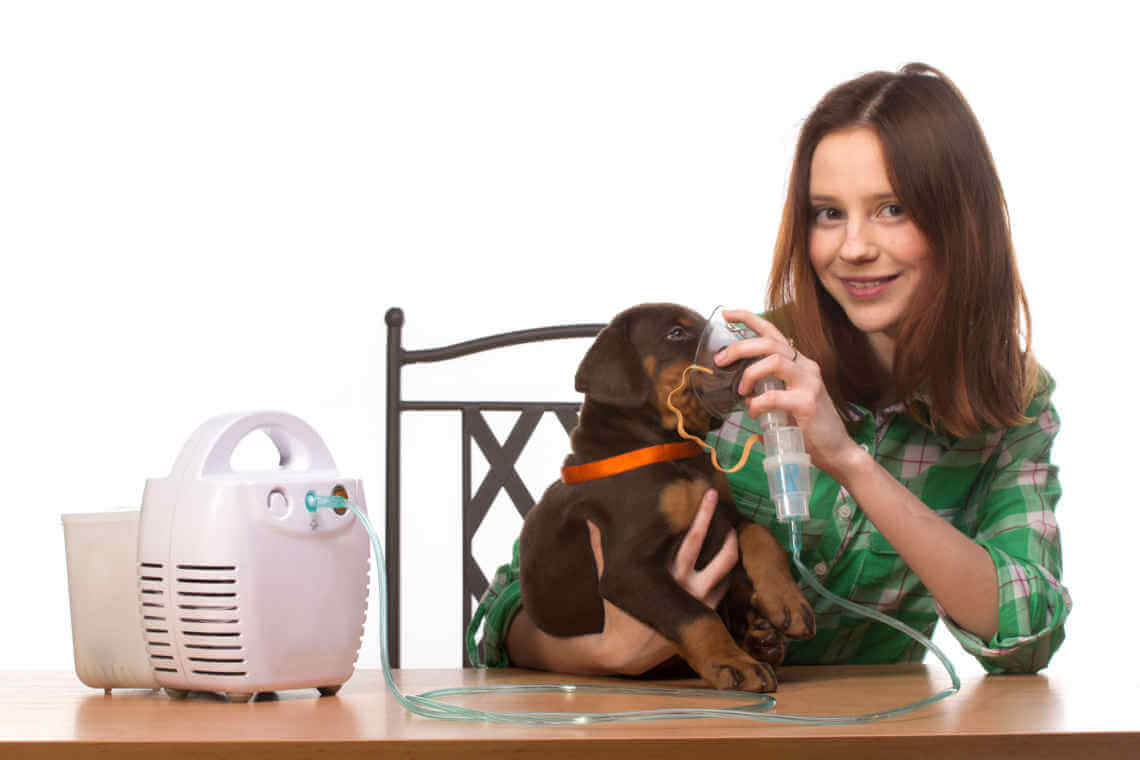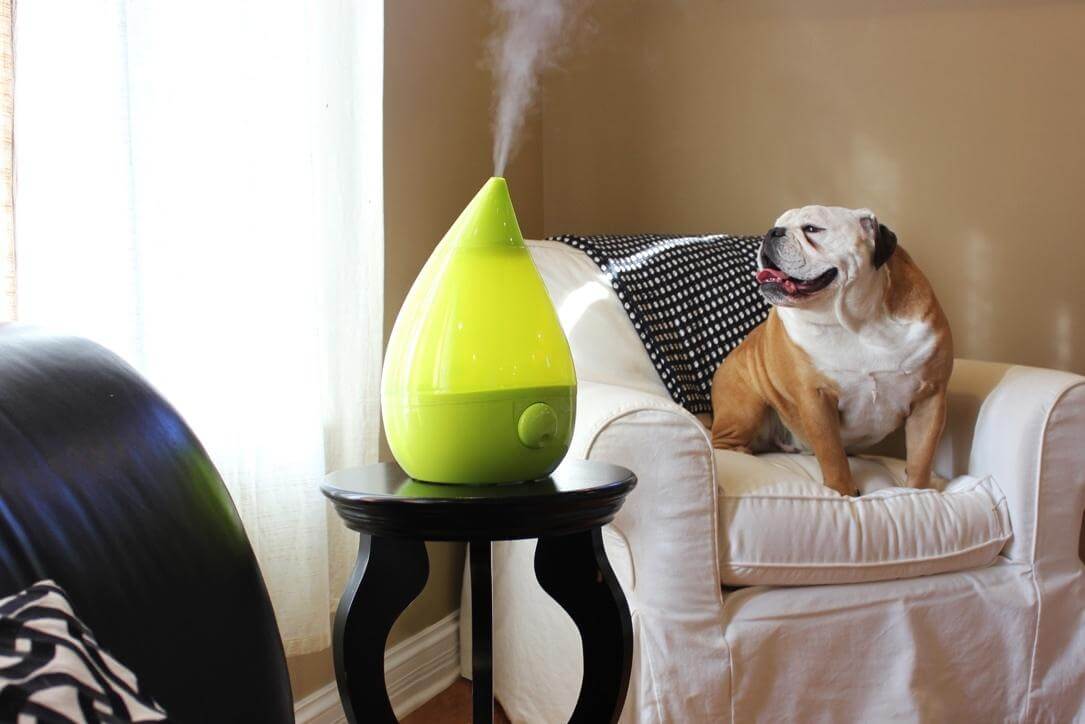
If you notice your dog having trouble breathing, it could be that your dog is having an asthma attack.
Dogs Can Develop Asthma Too
Dogs, similar to humans, can be affected by asthma, also known as allergic bronchitis, caused by an allergic reaction. Usually something in your dog’s environment triggers his airways to become irritated. When they come into contact with their allergen it causes inflammation and mucus in the narrow airways causing them to constrict and make it very hard for your dog to breath.
Asthma is a potentially harmful and life-threatening condition for your dog if left unchecked, so it’s important to know the signs and seek treatment if you suspect your dog has asthma.
How Do I Know If My Dog is Having an Asthma Attack?
The main symptom a dog will have is difficulty breathing. They usually will wheeze, be short of breath and display heavy panting.
All dogs pant when they are hot, but panting is different than asthma. An asthma attack is scary to watch, especially if it happens to a furry family member.

Signs of an Asthma Attack in Dogs
- Breathing distress (heavy wheezing and having trouble expanding their lungs. Seek vet care immediately if they have trouble breathing.)
- Coughing
- Gasping
- Wheezing
- Loss of energy
- Loss of appetite
- Wide mouth panting (heavy and longer than normal panting)
- Gums become pale or blue in an extreme attack (in this case seek emergency vet care immediately)
What Breeds are Particularly Susceptible to Asthma?
Older, smaller breed dogs are more susceptible to asthma than larger breed dogs because their lungs and airways are smaller.
What Causes Asthma in Dogs?
Allergies are almost always the cause of a canine asthma attack, but these other problems should not be ruled out as well:
- worms
- viral or bacterial infections such as pneumonia
- and some cancers
These should also be checked if you suspect asthma.
Common Allergens that Cause Asthma in Dogs
- One or more of these allergens can possibly cause your dog to have an asthma attack.
- Smoke (from wood stove, fireplace, local wildfires, or cigarettes)
- Household chemical cleaners
- Air fresheners
- Pollen in the air
- Perfumes
- Air pollution
- Mold and mildew
- Pesticides
- Some cooking odors
- Fertilizers
- Grasses and ragweed
- Heavy smog
- Fresh paint
- Dust mites
- Cat litter dust
Luckily many of these can be eliminated or reduced from your dog’s environment if you can figure out which ones are causing the allergic reaction.

How To Prevent Asthma Attacks in Dogs
- Don’t smoke around your dog
- Don’t use the fireplace or wood burning stove.
- Change to all green household cleaners such as white vinegar
- Consider changing flooring in your house to laminate or hardwood. Carpets are loaded with chemicals and harbor mold and dust mites.
- Throw out or give away your air fresheners. Instead use baking soda around the house.
- Use a HEPA filter in your air conditioners
- Change your furnace filters often
- Use an air purifying machine in the home
- Use small amounts of essential oils instead of perfumes
- Only take short walks during pollen and allergy season
- Bathe your dog often with non-chemical green shampoos
- Reduce any overweight issues your dog may have
- Feed them only healthy low allergen foods with no wheat and no corn or rice.
Diagnosis and Treatment for Asthma in Dogs
If you see signs of asthma, get your dog checked by a vet as soon as you can.
A chest x-ray will usually alert your vet of any asthma concerns.
There are other tests that can be done to diagnose canine asthma, such as a bronchoscopy, which is a procedure that uses a tiny camera put down your dog’s mouth into the bronchi to see the inside of the airway and lungs to collect samples.
To help the vet diagnose your dog properly remember to give them plenty of information. Anything you can think of that may be important will help. Remember to tell the vet how often your dog coughs, how long they cough for, and if it’s a wet or dry cough. The more information you give the easier the vet can make a proper diagnosis and provide treatment options.
According to Healthypets, if your dog comes to the vet having an asthma attack they may give a small dose of epinephrine to stop the attack, which could save your dog’s life. He will also be given pure oxygen right away to help his breathing.
If the problem becomes chronic the attacks can cause lifetime damage to the tissue lining of the respiratory airways, so it is important to see the vet.
Long term medication treatment may not be necessary, but if it becomes chronic asthma they may be given a bronchodilator and steroid inhaler.
The most important long-term treatment for your dog is identifying his specific allergic triggers in his environment and avoiding them at all costs. You can also look for holistic natural remedies to help control the inflammation in your dog’s lungs caused by the allergens they have around them. You can get more natural options from a holistic vet in your area.

We live in a dry climate here in Colorado Springs so you may want to try using a humidifier to help your dog breathe.
Although asthma is not very common in dogs it is important to know the symptoms, especially if you have a smaller breed. If your dog does have an asthma attack it is easy to prevent more from happening by clearing out all the allergens around your dog’s environment and finding his specific triggers.
Medication is available to those older dogs that get chronic allergic bronchitis attacks. Taking preventative measures for asthma allergens, and having routine vet checks your dog will live a long and happy life with you.

Does your dog have asthma? Did you find the specific triggers that cause the asthma attacks? What advice would you give someone who just found out their dog has canine asthma? Share with the Canine Campus community in the comments below.
Source:
Mercola.com, 24 July 2016, healthypets.mercola.com/sites/healthypets/archive/2016/07/24/pet-asthma.aspx.






 A Guide to Laser Therapy for Dogs
A Guide to Laser Therapy for Dogs Why Routine Dog Dental Care Includes Vaccinations
Why Routine Dog Dental Care Includes Vaccinations 8 Trustworthy Tips for Selecting the Right Dog Food
8 Trustworthy Tips for Selecting the Right Dog Food






Please be careful using essential oils around your pet as well. Some are very toxic if Inhaled. If you need to defuse then, make sure to check that they are safe for your pet first.